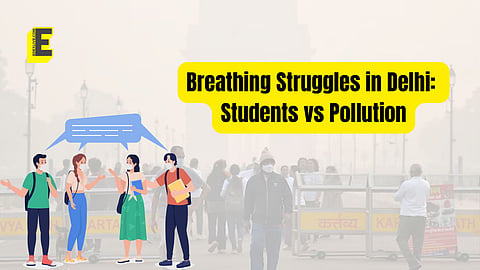

The toxic air blanketing the national capital has brought life, in general, and particularly student life in Delhi to a standstill, with Jawaharlal Nehru University (JNU), Delhi University (DU), and Jamia Millia Islamia announcing a complete shift to online classes until November 23.
Delhi's air pollution soared to over 17 times the safe limit, with worsening smog forcing authorities to impose restrictions on trucking, halt construction activities, and close schools and colleges.
Many of these students, away from their families, are struggling to balance their health and academics in the midst of this environmental crisis. In an exclusive conversation with EdexLive, students in Delhi shared their thoughts and concerns.
Challenges faced by students
Students from outstation cities, who form the backbone of Delhi’s academic crowd, are among the worst hit.
With limited resources and no family support, many find themselves grappling with both physical health and mental exhaustion. In addition to this, they are living in paying guest accommodations or rented rooms, often without proper ventilation or air purifiers, makes it difficult to cope with the polluted environment.
Sejal Chaudhary, a student at Campus Law Centre shared her plight, “I have been feeling sick consistently since I came back from home after Diwali and this was despite staying indoors. I wish I were in my hometown, Mount Abu, instead of dealing with the pollution in Delhi. When I open my windows here, the smog just pours in. It's strange because even though I’m far from home, the scenes outside don’t make me feel homesick — they’re so similar to what I’d see in Mount Abu." Except that in Delhi, the air outside is toxic.
For many, the sudden transition to online mode has disrupted their study schedules and mental health.
Aman Mewara, a student from Law Faculty, said, “We were already dealing with academic pressures. Now, adapting to online mode again, along with health concerns, has made it mentally exhausting. Due to the pollution, the campus feels like it did during the COVID lockdown period, with students staying indoors to avoid the smog. It’s unsettling, almost like we're going back to those difficult times."
He added that the hardest hit are the students with limited financial resources as staying in constrained spaces in North Campus worsens their situation, pushing students to return to their hometowns.
However, not everyone can afford the travel costs. Switching to online mode for just four days doesn’t help — students who went home must return immediately, and those still on campus are left with no real benefit.
Health risks and accessibility concerns
Beyond the academic hurdles, many students face increasing health issues. Breathing feels like a chore, even indoors.
Suraj Dhakad a research intern at DSA shared, “Coming from Gwalior, Madhya Pradesh, where the air quality is significantly better, heavy pollution here has made breathing difficult and is leading to teary red eyes and even skin infections, impacting my daily activities and overall well-being."
"Despite having a submersible pump in my PG accommodation, I am forced to buy filtered water for drinking due to water quality concerns. This adds strain, both physically and financially and is affecting my health more severely than I expected," he shares.
Ashish Barnwal, a Civil Service aspirant from Bihar currently residing in Rajendra Nagar shared similar concerns about his health, “I’m currently dealing with a throat infection, something I’ve never experienced before. This has affected my preparation and resulted in a loss of time that I simply can't afford.”
Meanwhile, accessibility issues have also emerged as a significant barrier for students who have to travel for internships and coaching classes. Shreya, a postgraduate student from Jawaharlal Nehru University (JNU) expressed her frustration, “I have to commute for my internship, which can’t be done online. The severe pollution leads to traffic jams, metro halts, and delays, resulting in me arriving late. This puts pressure on me from seniors and even results in stipend deductions. Not everyone has their own vehicle, so we rely on public transport.”
A long road for students
These experiences reflect the grim reality faced by students caught in Delhi’s pollution crisis finding themselves at the crossroads of health and education.
The toxic air has not only forced them to adapt to online learning but also compounded their struggles with isolation, disrupted routines, and deteriorating well-being.
A place, Delhi, once known as an education hub, has now become a headquarters of pollution.
